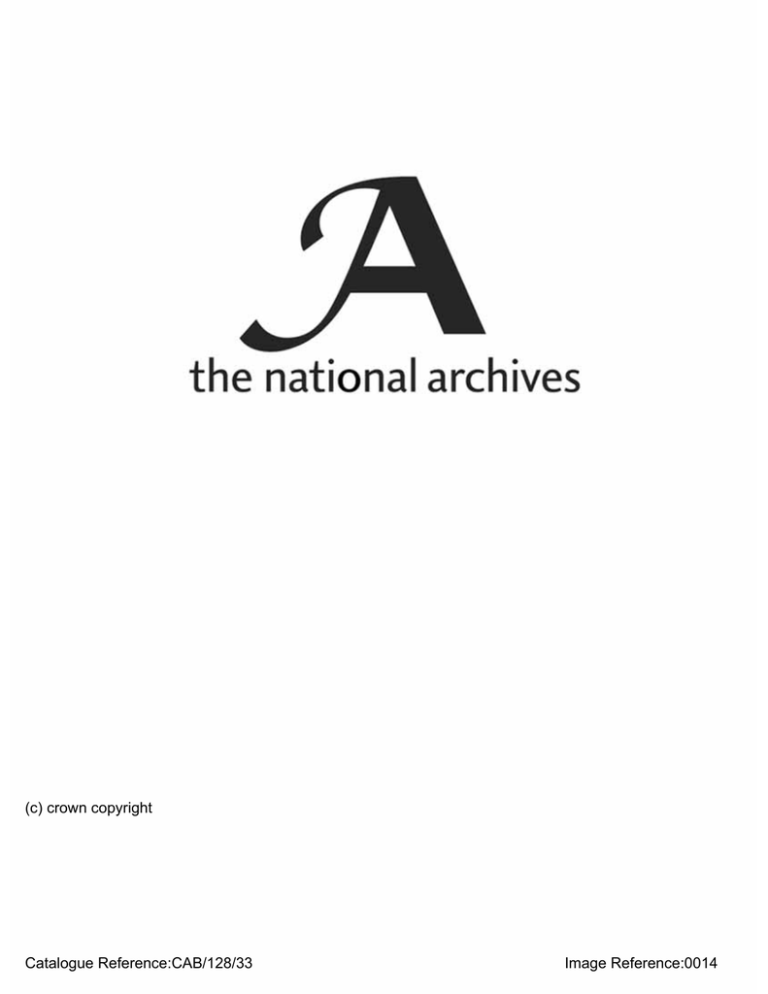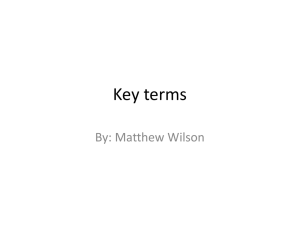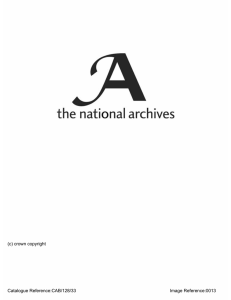(c) crown copyright Catalogue Reference:CAB/128/33 Image Reference:0014
advertisement

(c) crown copyright Catalogue Reference:CAB/128/33 Image Reference:0014 S E C R E T - THIS D O C U M E N T IS T H E P R O P E R T Y OF H E R BRITANNIC MAJESTY'S G O V E R N M E N T Primed for the Cabinet. March 1959 C.C. (59) Copy N o . 3 2 14th Conclusions CABINET CONCLUSIONS of a Meeting of the Cabinet held at 10 Downing on Wednesday, 4th March, 1959, at 11 -30 a.m. Street, S.W.1, Present: The Right H o n . HAROLD MACMILLAN, M . P The Right H o n . R. A. BUTLER, M . P . , Secretary of State for the Home Department and Lord Privy Seal. The Right H o n . SELWYN L L O Y D , Q.C., M.P., Secretary of State for Foreign Affairs. The Right H o n . The EARL O F H O M E , Secretary of State for Commonwealth Relations. The Right H o n . JOHN MACLAY, M.P., Prime Minister. The Right H o n . VISCOUNT KILMUIR, Lord Chancellor. The Right H o n . D. HEATHCOAT A M O R Y , M.P., Chancellor of the Exchequer. The Right H o n . ALAN LENNOX-BOYD, M.P., Secretary of State for the Colonies. The Right H o n . VISCOUNT HAILSHAM, Q.C., Lord President of the Council. Secretary of State for Scotland. The Right Hon. DUNCAN SANDYS, M . P . , The Right H o n . Sir D A V I D ECCLES, M.P., President of the Board of Trade. Minister of Defence. The Right H o n . IAIN MACLEOD, M . P . , The Right H o n . H E N R Y BROOKE, M.P., Minister of Housing and Local Minister of Labour and National Government and Minister for Welsh Service. Affairs. The Right H o n . HAROLD WATKINSON, The Right H o n . LORD M I L L S , Minister M.P., Minister of Transport and Civil of Power. Aviation. The Right Hon. GEOFFREY L L O Y D , M.P., T h e Right Hon. JOHN HARE, M.P., Minister of Agriculture, Fisheries and Minister of Education. I Food. Dr. The Right H o n . CHARLES H I L L , M.P., Chancellor of the Duchy of Lancaster. The following were also present: The Right Hon. Sir MANNINGHAM-BULLER, REGINALD Q.C., M.P., The Right H o n . E D W A R D H E A T H , M.P., Parliamentary Secretary, Treasury. Attorney-General (Item 3). Secretariat: The Right Hon. Sir NORMAN BROOK. Mr. B . S T . J . T R E N D . Mr. M . R E E D . CONTENTS Subject Prime Ministers Visit to Moscow Parliament Federation of Rhodesia and Nyasaland Territorial Waters Icelandic Fishery Limits Prime k,i ! "*'!!'.L ^ Visit to Moscow. (Previous Reference : C.C. (59) 13th Conclusions, Minute 2.) * 1 . The Prime Minister and the Foreign Secretary made a P to the Cabinet on the discussions which they had held with the Soviet Leaders during their visit to the Soviet Union. r e o r t The discussions had opened in a cordial atmosphere and Mr. Khrushchev's attitude in the initial stages had been friendly, though he had given no indication of flexibility on the Berlin question. But on 24th February he had made a public speech, in connexion with the elections which were in progress, in which he had reaffirmed the intransigent stand on Berlin which had been taken in the recent Soviet Notes and had expressed stiff criticism of the attitude of the Western Powers. The Prime Minister had, therefore, thought it necessary to make it plain to Mr. Khrushchev, when the discussions were resumed on the following day, that the Western Governments were not prepared to accept any unilateral modification of the rights which they enjoyed in Berlin by virtue of their status as occupying Powers and that, if the Soviet Government persisted in this course without attempting to achieve a settlement by negotiation, a very dangerous situation would arise. Mr. Khrushchev had reacted sharply to this statement. He had indicated that the Soviet Union would not be dissuaded from their policy by threats of war and he had delivered an intemperate attack upon what he regarded as the aggressive intentions of the Western Allies. He had also said that he would be unable to carry out his earlier intention to accompany the British Ministers to Kiev, and that Mr. Mikoyan would similarly be unable to meet them at Leningrad. Subsequently, however, he had reverted to a more conciliatory attitude. Mr. Mikoyan and Mr. Gromyko had both appeared at Leningrad, and had brought a message from Mr. Khrushchev indicating that he was looking forward to further discussions of substance when the party returned to Moscow. In these final stages of the visit discussions were resumed in the original atmosphere of cordiality. Mr. Khrushchev, while maintaining his intention to conclude a peace treaty with East Germany, had indicated that he was ready to seek in negotiation a solution of the problem of West Berlin, which would not prejudice the vital interests of either the Soviet Union or the Western Allies, and he had no longer insisted that such a solution must be found before 27th May. He had seemed to be ready to make some concessions to the Western point of view. For example, he had indicated that the Soviet Government would be ready to guarantee the status of West Berlin as a free city and to send a token force of Soviet troops to join Western troops in guaranteeing Western access to it. Moreover, they would not seek to insist that the Western Powers should recognise the East German Government de jure and would be content that any necessary contacts with it should be maintained through a third party. They might also be willing to acquiesce in an arrangement whereby the Federal Government and the East German Government would remain associated with the North Atlantic Treaty Organisation and the Warsaw Pact respectively. Mr. Khrushchev had agreed that questions of this kind would need to form the subject of further negotiation. He would have preferred that they should be settled as part of a comprehensive discussion of all major outstanding issues at a meeting of Heads of Governments to be held towards the end of April. But he had indicated that, if the Western Powers still regarded a meeting of Foreign Ministers as an essential preliminary, the Soviet Union would be prepared to accept such a meeting with an agenda confined to the two questions of a peace treaty with Germany and the status of West Berlin. The most significant result of these discussions was the fact that the atmosphere of crisis which had been developing in relation to the date of 27th May had been reduced. The Soviet Government Previously recorded in a Confidential Annex. SECRET were now prepared to adjust the timetable, within limits, to the requirements of further negotiations. On the long-term future of Germany, they remained unwilling to discuss the possibility of reunification—which, they insisted, was a matter to be settled between the two Germanies. It was evident that they favoured the indefinite partition of the country, though they were prepared to contemplate some kind of confederation of the two parts. But the discussions had confirmed that, although they were concerned to avoid a major war, which they recognised would be as disastrous for themselves as for the Western Powers, they v/ere resolved to go forward with their policy of concluding a peace treaty with East Germany. In these circumstances it was important that, while publicly maintaining the solidarity of the Western position, we should seek to convince our Allies of the wisdom of making a realistic response to the Soviet willingness to negotiate. If the Western Powers were not prepared to go some way to meet the Soviet Union, they would face, in the near future, either a major diplomatic defeat as the result of adopting an aggressive policy which, in the event, they would be unable to sustain, or the risk of a major war as the result of following that policy to its logical conclusion. Our Allies might be reluctant to recognise the need for a more constructive approach towards the problem of Berlin and might be liable to criticise us for appearing to be ready to yield to Soviet intransigence. Nevertheless, it would be prudent that we should recognise the Soviet determination to regularise the division of Germany, with some consequential adjustment in the status of Berlin, and should seek to extract the maximum advantage from the willingness of the Soviet leaders to negotiate that adjustment. The implications of this policy would need further consideration; but the course which we should adopt would need to be finally approved by the Cabinet during the following week in the light of the forthcoming conversations with the Governments of France and Federal Germany and before discussions were opened with the United States Government. In discussion the Cabinet expressed their appreciation of the skill and forbearance with which the Prime Minister and the Foreign Secretary had conducted the discussions with the Soviet leaders in difficult circumstances and in the face of considerable provocation. Effectively, the leadership of the Western world now rested with the United Kingdom Government; and the initiative which we had secured should be followed up with the minimum of delay. In view of the disturbing reports which had recently been received from Washington about the increasing hostility of the United States Government towards the Soviet Union, it was for consideration whether the Prime Minister^ visit to Washington should take priority over his visits to Paris and Bonn—in an endeavour to ensure that, before the United States were irretrievably committed to a policy of solving the problem of Berlin by force, more moderate counsels might prevail. On the other hand, it had now been made clear that the Soviet Union would no longer seek to force a decision on this problem by 27th May; and there was, therefore, less risk that the United States Government would take such drastic action within the next few weeks as to nullify the tactical advantage which had been secured by the Prime Ministers visit to Moscow. It might be preferable, therefore, that the Prime Minister should adhere to his original intention to inform General de Gaulle and Dr. Adenauer of the results of his discussions with Mr. Khrushchev before proceeding to Washington to concert policy with President Eisenhower. It would be dangerous to give the French and German leaders any grounds for supposing that we were seeking to reach a private understanding with the United States without their participation; and the Prime Minister^ position during his visit to Washington might well be strengthened if he had first informed himself of the attitude of the French and German Governments towards the situation as it had now been disclosed. A further consideration was that time was needed for the Cabinet to review their own policy and to discuss how best to persuade the United States Government of the advantages of a more flexible attitude. In the United States both the public and the Administration would view with suspicion any proposals which might suggest a weakening of our resolution; and it would be necessary to convince them that, if the problem of Berlin could be solved on the lines which had emerged during the discussions with Mr. Khrushchev, the substance of the Western position would be preserved. In particular, the rights of the Allies in relation to the Western sectors of Berlin would be maintained; the Western Powers could perhaps avoid entering into direct relations with the East German Government; and the position of Western Germany would remain unchanged. A settlement on these lines would imply the continuing partition of Germany and would therefore need to be presented with care to public opinion in Germany. But it could also be represented as involving no sacrifice of principle by the Western Powers; and, by removing an immediate threat to peace, it might prepare the way for a solution of the other major issues on which the Governments of the free world and the Soviet Union were at present divided. The Cabinet—­ (1) Invited the Foreign Secretary to circulate a record of the discussions held with the Soviet leaders in Moscow, and memoranda on the questions of policy and procedure which would need to be discussed with the United States Government during the forthcoming visit of the Prime Minister and the Foreign Secretary to Washington. (2) Agreed to resume their discussion of these problems at a meeting on 11th March. Parliament. 2. The Cabinet were informed of the business to be taken in the House of Commons in the following week. Federation of Rhodesia and Nyasaland. (Previous Reference: C.C. (59) 13th Conclusions. Minute 1.) 3. The Cabinet were informed of the latest developments in the disturbances in the Federation of Rhodesia and Nyasaland. Although it might become necessary to declare a state of emergency in Northern Rhodesia, the Prime Minister of the Federation was confident that the authorities could control the situation and that it would not be necessary to ask the United Kingdom Government for assistance. If, however, reinforcements proved to be necessary, we could transfer an infantry battalion from Kenya to Nyasaland. The time required for this operation could be reduced by two days if the aircraft allocated for the purpose were moved to Kenya forthwith; and, in view of the uncertainty of the situation, it might be desirable to take this precaution. The Cabinet— Invited the Minister of Defence to arrange for the transfer to Kenya of the aircraft which would be required if it became necessary to despatch reinforcements to the Federation of Rhodesia and Nyasaland. Territorial 4. The Foreign Secretary said that, in accordance with the Waters. normal pattern of seasonal fishing, the British fishing fleet had (Previous recently been moved under naval protection from the east coast References: of Iceland to two havens on the south and west coasts. These areas C.C. (59) 4th were already crowded with Icelandic fishing vessels and there was Conclusions, Minute 6, and some risk that incidents might occur. Steps had been taken, however, C.C. (58) 86th both by the British Trawlers Federation and by the Commodore of Conclusions, our Fisheries Protection Squadron, to ensure that our own vessels Minute 3.) refrained from provocative behaviour; and the Icelandic Government Icelandic had been invited to put forward any suggestions of their own to Fishery preserve orderly fishing. Limits. The Cabinet— Took note, with approval, of this statement. Cabinet Office, 4th March, S.W.1, 1959.







